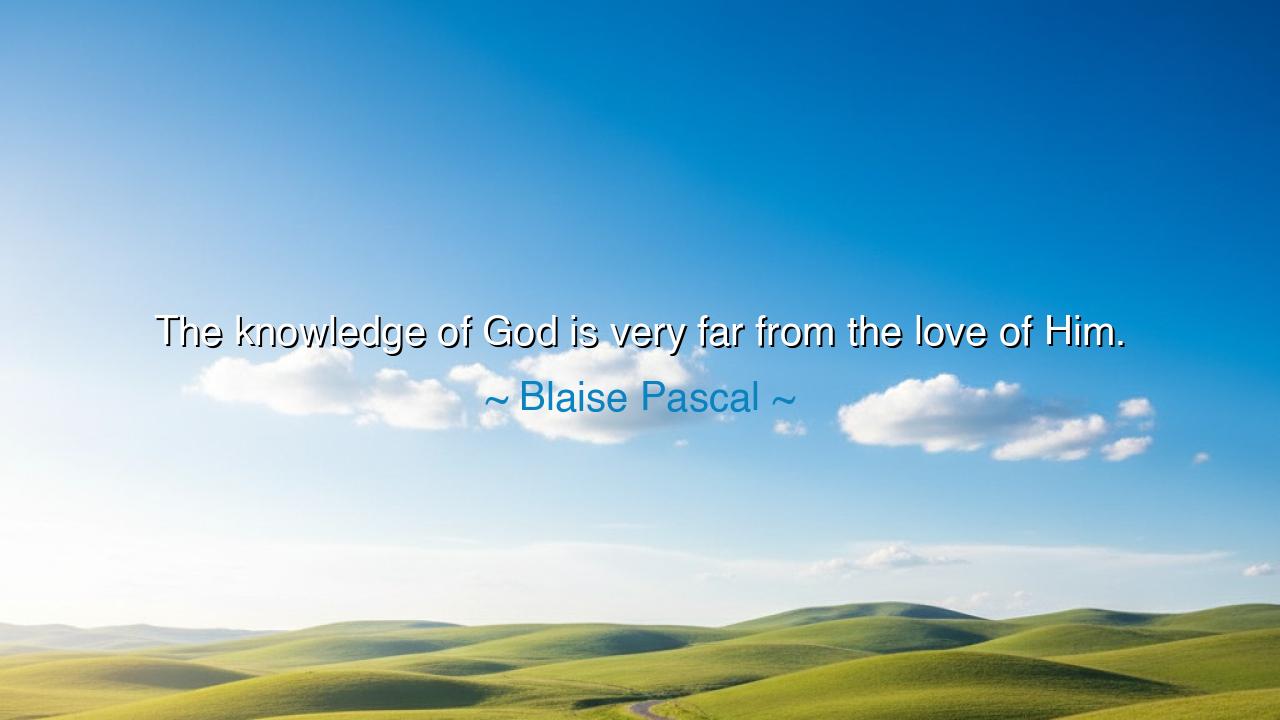
The knowledge of God is very far from the love of Him.






"The knowledge of God is very far from the love of Him." Thus spoke Blaise Pascal, the philosopher, scientist, and mystic of seventeenth-century France, whose heart was as restless as his mind was brilliant. His words cut like a double-edged sword, for they remind us that there is a chasm between knowing about God and truly loving Him. To fill one’s head with doctrines, arguments, and proofs is one thing; to fill one’s heart with devotion, humility, and love is another. Pascal saw clearly that the one can exist without the other—and that this distance is the great danger of faith without spirit.
The meaning of this saying is profound. Knowledge of God is intellectual; it is the accumulation of facts, scriptures, traditions, and arguments that affirm His existence. It is the province of theologians and philosophers, who debate and dissect the divine as though He were a problem to be solved. But love of God is entirely different—it is personal, intimate, transformative. It does not dwell in the mind alone but sets the soul aflame. One may know the name of God, His attributes, and His commandments, and yet remain untouched by love. To Pascal, this was tragedy, for it is love, not knowledge, that saves.
History offers us many examples of this separation. Consider the Pharisees of the New Testament, who possessed great knowledge of God’s law, yet were condemned by Christ for lacking mercy, humility, and love. They recited scripture but failed to embody its spirit. Their minds were rich with understanding, but their hearts were barren of compassion. In them we see Pascal’s warning: that knowledge without love can harden the soul instead of opening it.
But history also shows us the beauty of love transcending knowledge. Saint Francis of Assisi, though unlearned in the sciences of theology, was aflame with love of God. His life of poverty, his care for the poor, and his reverence for all creation shone brighter than the erudition of many scholars. Francis proved that love, even without great knowledge, has power to move the world. His simple devotion reached where intellectual argument could not. He embodied Pascal’s truth: it is better to love God deeply than to merely know Him distantly.
Pascal’s own life was a testimony to this tension. A prodigy of mathematics and physics, he could pierce the mysteries of the universe with his mind. Yet, in his famous Memorial, written after a powerful religious experience, he confessed that reason alone could not save him. It was not his knowledge of God that transformed him, but the burning love of God that overwhelmed him in the night. For in that moment, the philosopher became a worshipper, and the scholar became a child before his Father.
The lesson for us is clear: do not mistake intellectual mastery for spiritual intimacy. To read of God, to argue about God, even to prove His existence with flawless reasoning—these are shadows if they do not lead to love. The heart must be engaged, the soul must be humbled, the life must be changed. Knowledge can point the way, but only love can walk the path.
Practical action follows. If you study, let your learning lead you to prayer. If you debate, let your words flow also into compassion. Read the sacred texts not only to understand them but to live them. Do not pride yourself on how much you know of God, but humble yourself in how much you love Him through mercy, forgiveness, and service to others. For love is the true wisdom, and without it, knowledge is empty.
So I say to you, children of tomorrow: remember the wisdom of Blaise Pascal. Knowledge of God may dwell in the mind, but love of God must live in the heart. Seek not only to know Him, but to love Him with all your being. For in love lies transformation, in love lies salvation, and in love lies the true union between the soul and its Creator. Knowledge will pass away, but love endures forever.






AAdministratorAdministrator
Welcome, honored guests. Please leave a comment, we will respond soon